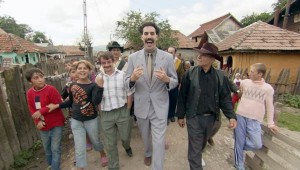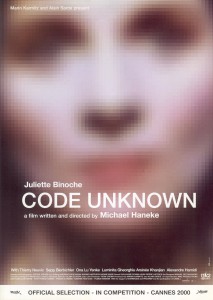
I’d like to ask some of the fans of Borat to explain something to me. I keep reading that this movie is a sly (or not so sly) critique of racism and intolerance based on ignorance, but Sacha Baron Cohen’s apparent semi-ignorant intolerance of the Kazakhs is almost always factored out of the discussion. It’s pretty easy to paint them as a pack of pathetic anti-Semites if you know nothing about them, but isn’t that the kind of glibness Borat is supposedly attacking?
Michael Moore has often been accused of a similar kind of one-upmanship, and with some justification, but why does the even less analytical Cohen get a free ride when he appeals to the same base impulses of the audience? The fact that, as recently revealed, he has the villagers of Kazakhstan speaking Hebrew suggests that maybe he’s enjoying a joke on his more “knowing” spectators as well as his more obvious on-screen targets. But I honestly don’t know what sort of thought — if any — lies behind his use of Kazakhstan or the choice of Hebrew. John Tierney in the New York Times (subscription required) has aptly pointed out that he always could have made Borat a citizen of an invented country instead.
Read more
From Cineaste (December 2001).
For a long time, I hesitated about reprinting this, but learning about Ray Carney’s unspeakable treatment of filmmaker Mark Rappaport (as detailed here) eliminated my compunctions.
For more about Rappaport’s work, here are three of the many links on this site:
http://www.jonathanrosenbaum.net/2014/05/40758/
http://www.jonathanrosenbaum.net/2018/05/mark-rappaport-2/
http://www.jonathanrosenbaum.net/2015/04/recommnded-viewing-mark-rappaports-i-dalio/
— J.R.
Cassavetes on Cassavetes
Edited by Ray Carney. London and New York: Faber and Faber, 2001. 526 pp., illus. Paperback: $25.00.
The Films of John Cassavetes: Pragmatism, Modernism, and the Movies
by Ray Carney. Cambridge, New York and Melbourne: Cambridge University Press, 1994. 322 pp., illus. Paperback: $24.95.
John Cassavetes: The Adventure of Insecurity
by Ray Carney. Second Edition. Walpole, MA: Company C Publishing, 2000. 64 pp., illus. Paperback: $15.00.
Shadows
by Ray Carney. London: British Film Institute (BFI Film Classics), 2001. 87 pp., illus. Paperback: $12.95.
John Cassavetes: Lifeworks
by Tom Charity. London, New York and Victoria: Omnibus Press, 2001. 257 pp., illus. Paperback: $19.95.
As nearly as I can remember, I had two opportunities to meet John Cassavetes in the flesh, both times in New York, and I deliberately passed on both of them. Shortly after Faces came out in the mid-Sixties, a friend from my home town in Alabama who worshipped that film even more than I did — Shadows was still my own favorite then — came to town and found a way of contacting and then going to meet his idol, who was preparing Husbands at the time; he invited me to come along, and I declined. Read more
From the Chicago Reader (June 28, 2002). — J.R.

Aptly subtitled “Incomplete Tales of Several Journeys,” the fifth feature by Austrian director Michael Haneke (2000, 117 min.), his best to date, is a procession of long virtuoso takes that typically begin and end in the middle of actions or sentences, constituting not only an interactive jigsaw puzzle but a thrilling narrative experiment comparable to Alain Resnais’ Je t’aime, je t’aime, Jacques Rivette’s Out 1, and Rob Tregenza’s Talking to Strangers. The film’s second episode is a nine-minute street scene involving an altercation between an actress (Juliette Binoche in a powerful performance), her boyfriend’s younger brother, an African music teacher who works with deaf-mute students, and a woman beggar from Romania; the other episodes effect a kind of narrative dispersal of these characters and some of their relatives across time and space. I couldn’t always keep up with what was happening, but I was never bored, and the questions raised reflect the mysteries of everyday life. This is Haneke’s first feature made in France, and the title refers to the pass codes used to enter houses and apartment buildings in Paris — a metaphor for codes that might crack certain global and ethical issues. Read more


